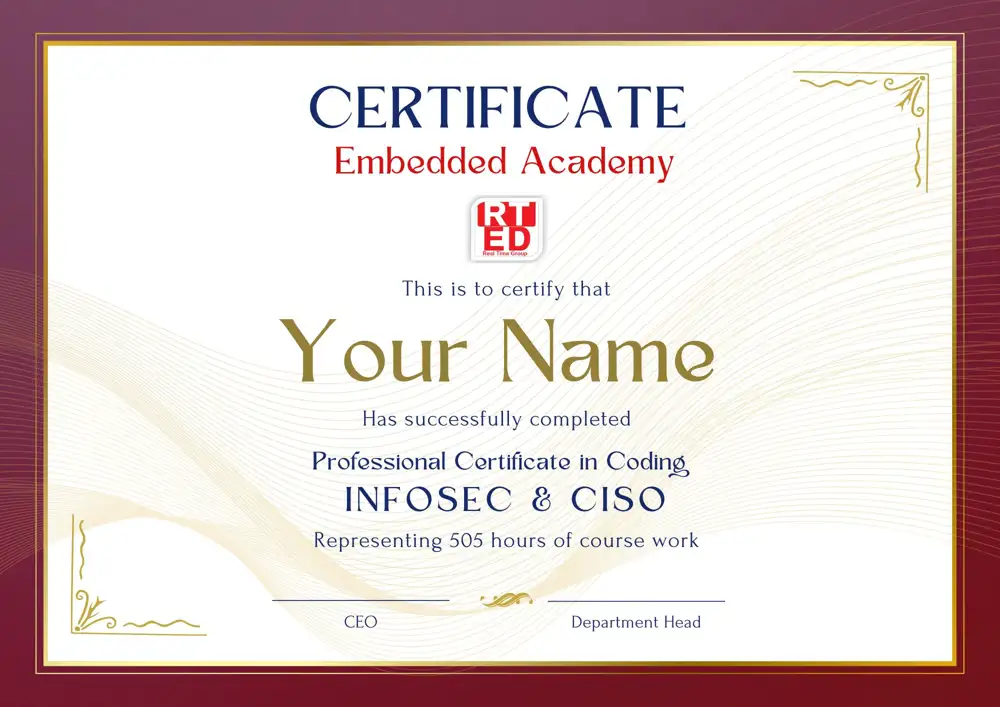Lead organizational security initiatives and strategies at a senior executive level.
Avg. Annual Salary Nationwide $245,820close
InfoSec & CISO Online Course – Become a Chief Information Security Officer with Hands‑On Risk, Compliance & Cyber Leadership Training
Designed for working professionals who want to move into senior information security and CISO roles, this InfoSec & CISO course teaches you how to design security frameworks, manage policies, and lead cybersecurity teams with confidence. You’ll work with real-world scenarios to build skills in risk assessment, incident response, regulatory compliance, and strategic security operations, guided by experienced security leaders. By the end, you’ll be ready to protect critical information assets, make high‑impact security decisions, and accelerate your career in the InfoSec and CISO track.
What skills will you gain with our online InfoSec & CISO course?
Strategic Security Management: Learn to build and manage organization-wide security strategies that protect business assets and support business goals.
Risk Assessment Techniques: Master practical methods to identify vulnerabilities, evaluate threats, and design effective mitigation plans.
Incident Response Preparedness: Gain hands-on expertise in planning, leading, and optimizing incident response to security breaches.
Regulatory Compliance: Understand major cybersecurity standards and regulations so you can keep your organization compliant and audit-ready.
Leadership and Team Management: Develop the leadership, communication, and management skills needed to lead high-performing cybersecurity teams.
With our online InfoSec & CISO course, you will gain a complete, job-ready skill set for advancing into Information Security Officer or CISO positions in a rapidly growing, high-demand field.
Lead organizational security initiatives and strategies at a senior executive level.
Avg. Annual Salary Nationwide $245,820
Oversee the operations of information security programs and ensure compliance with security policies and regulations.
Annual Salary
Assess security systems and measures, identify vulnerabilities, and suggest enhancements.
Annual Salary
Coordinate responses to security breaches and work to minimize impact and prevent future incidents.
Annual SalaryInfoSec & CISO Track: From Novice to Expert
Launch your career in InfoSec & CISO with our most comprehensive educational track. This program is meticulously designed to provide you with an all-encompassing understanding of the field, ensuring you achieve the highest level of expertise.
Key Features:
This track is your gateway to becoming a proficient InfoSec & CISO expert, equipping you with the knowledge, skills, and hands-on experience needed to excel in this rapidly evolving and in-demand area of technology.
| Software Tools | Course duration | |
|---|---|---|
| Linux Admin Course | 50 academic hours | |
|
Master Linux system administration, from basic commands to advanced system management, security, and networking.
| ||
| Bash Scripting Course | 25 academic hours | |
|
Learn shell scripting for task automation, system administration, and efficient command-line operations in Linux environments.
| ||
| Python Course | 90 academic hours | |
|
Focusing on Python 3, you’ll learn to program object-oriented, real-industry applications.
| ||
| Networking Course | 40 academic hours | |
|
Master computer networking fundamentals, protocols, and implementation for robust network applications.
| ||
| GIT (Version Control) Course | 25 academic hours | |
|
Learn Git’s core features and workflow, different ways to undo changes or save multiple versions, and collaborate with other teams and developers.
| ||
| CISO Courses | Course duration | |
| Cyber Security Fundamentals Course | 20 academic hours | |
|
Master core cybersecurity principles, threat landscapes, and essential security practices for protecting digital assets.
| ||
| Computer Networking and Infrastructure Security Course | 60 academic hours | |
|
Master network security architecture, protocols, and defense strategies for infrastructure protection.
| ||
| Web Server and Web Application Security Course | 30 academic hours | |
|
Learn to identify, prevent, and mitigate security vulnerabilities in web servers and applications.
| ||
| Cyber Security in IOT, SCADA and EmbeddedCourse | 25 academic hours | |
|
Learn security principles for Internet of Things, industrial control systems, and embedded devices.
| ||
| Cyber Security in Cloud Computing & Virtualization Course | 25 academic hours | |
|
Master security practices for cloud platforms, virtual environments, and containerized applications.
| ||
| Cyber Threats Detection & Network Monitoring Course | 30 academic hours | |
|
Learn advanced threat detection techniques and network monitoring for identifying and responding to cyber attacks.
| ||
| Incident Response and Accountability Course | 20 academic hours | |
|
Event response management and accountability in the field of information security are crucial components of the course. Participants will learn how to efficiently respond to security incidents, including identification, response, analysis, and recovery. Emphasis will be placed on action protocols in disaster scenarios and how to enhance the security process to ensure data resilience and organizational protection. Students will explore legal implications, important guidelines, and organizational responsibilities in dealing with security incidents, as well as how to develop prevention and action plans to address persistent threats.
| ||
| Information Security Governance Course | 25 academic hours | |
|
Information security governance is a comprehensive framework that ensures effective protection of sensitive data within the organization. The process includes policy definition, risk management guidelines, role establishment, and securing systems. An up-to-date information security governance strategy demands commitment, leadership, clear communication, risk analysis, and continuous monitoring. Aligning security objectives with business goals contributes to holistic security and ensures proactive access to information. By establishing a strong governance structure, organizations can safeguard their assets, maintain trust, and adapt to evolving cyber threats effectively.
| ||
| CISO Roles & Responsibilities Course | 40 academic hours | |
|
The course "Roles and Responsibilities of CISO" explores the role of the Chief Information Security Officer (CISO) in organizations. Students will learn about the responsibilities of the manager in charge of information security, including the central management of security policies, threat and risk analysis, security program planning and management, and disaster recovery. The course helps understand the organizational responsibilities related to information security and the connection between the CISO and the organization's management. Students will gain in-depth knowledge about defense requirements, addressing advanced threats, legal aspects, safety planning, and more.
| ||
InfoSec & CISO Specialist Track
Elevate your software development expertise with our focused InfoSec & CISO program. This track is carefully crafted for professionals with prior experience in software and application development, aiming to sharpen your skills in this specialized domain.
Key Features:
This track offers a streamlined path to mastering InfoSec & CISO , ideal for seasoned developers looking to expand their expertise or pivot into this high-demand field. Gain the specific knowledge and skills needed to excel in InfoSec & CISO development and stand out in the competitive tech industry.
| CISO Courses | Course duration | |
|---|---|---|
| Cyber Security Fundamentals Course | 20 academic hours | |
|
Master core cybersecurity principles, threat landscapes, and essential security practices for protecting digital assets.
| ||
| Computer Networking and Infrastructure Security Course | 60 academic hours | |
|
Master network security architecture, protocols, and defense strategies for infrastructure protection.
| ||
| Web Server and Web Application Security Course | 30 academic hours | |
|
Learn to identify, prevent, and mitigate security vulnerabilities in web servers and applications.
| ||
| Cyber Security in IOT, SCADA and EmbeddedCourse | 25 academic hours | |
|
Learn security principles for Internet of Things, industrial control systems, and embedded devices.
| ||
| Cyber Security in Cloud Computing & Virtualization Course | 25 academic hours | |
|
Master security practices for cloud platforms, virtual environments, and containerized applications.
| ||
| Cyber Threats Detection & Network Monitoring Course | 30 academic hours | |
|
Learn advanced threat detection techniques and network monitoring for identifying and responding to cyber attacks.
| ||
| Incident Response and Accountability Course | 20 academic hours | |
|
Event response management and accountability in the field of information security are crucial components of the course. Participants will learn how to efficiently respond to security incidents, including identification, response, analysis, and recovery. Emphasis will be placed on action protocols in disaster scenarios and how to enhance the security process to ensure data resilience and organizational protection. Students will explore legal implications, important guidelines, and organizational responsibilities in dealing with security incidents, as well as how to develop prevention and action plans to address persistent threats.
| ||
| Information Security Governance Course | 25 academic hours | |
|
Information security governance is a comprehensive framework that ensures effective protection of sensitive data within the organization. The process includes policy definition, risk management guidelines, role establishment, and securing systems. An up-to-date information security governance strategy demands commitment, leadership, clear communication, risk analysis, and continuous monitoring. Aligning security objectives with business goals contributes to holistic security and ensures proactive access to information. By establishing a strong governance structure, organizations can safeguard their assets, maintain trust, and adapt to evolving cyber threats effectively.
| ||
| CISO Roles & Responsibilities Course | 40 academic hours | |
|
The course "Roles and Responsibilities of CISO" explores the role of the Chief Information Security Officer (CISO) in organizations. Students will learn about the responsibilities of the manager in charge of information security, including the central management of security policies, threat and risk analysis, security program planning and management, and disaster recovery. The course helps understand the organizational responsibilities related to information security and the connection between the CISO and the organization's management. Students will gain in-depth knowledge about defense requirements, addressing advanced threats, legal aspects, safety planning, and more.
| ||
Payment Plans
As Low As$330/Month

Benny Cohen
Embedded Academy Founder and CEO
As a long-time veteran in the technology industry, Benny Cohen combines a deep passion for technology with extensive field experience. With a B.Sc. in Electronics Engineering and an M.Sc. in Communication Engineering, he has spent over 20 years developing software and hardware systems, including the last few years focusing on the cybersecurity industry. In addition to his role as the company founder & CEO, Benny also operates as a hands-on practitioner who specializes in penetration testing and has conducted significant security assessments for leading enterprises and security companies worldwide. His approachable teaching style and real-world expertise make learning both engaging and relevant.
Requirements for eligibility for the certificate:
As part of the professional experience each graduate undergoes we help in integrating them into the high-tech world through our job search assistance, personalized resume building, and placement in a technology company.
1
Curriculum customization
We'll help you choose and structure the right program most suitable for your needs and career aspirations.
2
Tech Training
Students who start with no prior knowledge of the field will receive the fundamentals required to complete the course.
3
Final Project
Working on your course project and internship with experienced developers.
4
Internship
Get real-world experience adapted to industry standards and requirements with our team of industry-leading engineers.
5
Job Interview
Graduates get resume-building assistance, interview simulations and career guidance.
A CISO certificate can provide you with advanced skills and knowledge in cybersecurity, making you a competitive candidate for high-level roles in information security management. It enhances your expertise in handling cyber threats, risk management, policy development, and response strategies, increasing your career opportunities and potential earnings.

